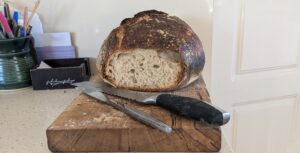I have been baking bread once or twice a week for seven years. My older brother gave me a The Bread Baker’s Notebook for my birthday this year. It’s the kind of beautifully designed hardcover volume you would find at a local independent bookshop or hipster homeware store. The Notebook has space at the front to log the birth, naming and feeding of your sourdough starters. Peppered throughout the book are splash pages with bread tips: “Always keep your sleeves rolled up. It’s annoying to have your hands deep in dough and deal with a slipping sleeve”; “If your bread goes stale, save it for French toast, croutons, panzanella, or grind it up for breadcrumbs.”
The bulk of the book is given over to ‘the bread log’, with various fields for each loaf you bake. First, you note down the recipe, method and conditions: kitchen temperature, your mood, your starter’s mood, types and amounts of flour, time of autolyze, rise, baking time. Then you record the outcome: the colour of the crust, the quality of the crumb, the taste (sour, bland, dry, gummy or perfect).
The introduction explains the logic:
There are many ways to learn to bake bread. Books. Websites. Videos. (So many videos!) Perhaps someone’s gifted you sourdough started or their favourite recipe. But the best teacher of bread baking is your own history with it. If you keep a record of your successes and failures, the bread will teach you how to bake better bread. Failure can be a beautiful process.
The principle behind this little book is a great one for improving in any area of life, whether sport, cooking, godliness or ministry practice: keep a diary.
Noticing
When it comes to growing in Christian character, or competence in preaching, leadership or evangelism, you will be surprised what you can learn and how you can grow simply by the discipline of taking note and reflecting upon your own experience. You can seek out a counsellor or mentor or chaplain to help you foster healthy patterns of thinking and relating to others. You can attend a conference or join a critique group to improve your ministry skills. But you can also start with nothing more than a notebook and a pen.
The discipline of keeping a diary is the discipline of noticing: being attentive to your own experience. In the rush and complexity of life we do so much based on habit, intuition, snap decisions and the demands of others. We shouldn’t wonder, then, if our work often bears the zig-zag marks of inconsistency and preventable flaws. Just like baking bread without being mindful of which factors led to a disappointing loaf. We shouldn’t be surprised if our growth is slow, if we are not proactively paying attention to what we are doing.
 The same is true of successes. If we don’t know what we did differently to facilitate a fruitful year of evangelism at church, or deliver a better than average sermon, or finally figure out how to work with 30% rye flour, we will struggle to repeat our success next time.
The same is true of successes. If we don’t know what we did differently to facilitate a fruitful year of evangelism at church, or deliver a better than average sermon, or finally figure out how to work with 30% rye flour, we will struggle to repeat our success next time.
Resolving
The last two fields of the bread log ask you to write down “Who did you give your bread to? Why?” and what “To do differently next time”. The first of these is not a learning from experience question but it is a welcome prompt to consider how to be generous and thoughtful; it introduces another noble measure of success.
The diary forces you to be explicit about what you have learned and what you will do about it. From my experience as a parent, team leader and ministry coach, there is immense power in the simple process of reflection, resolve and accountability. We can so easily fail to notice what went right or wrong, to plan in the light of these observations or to follow through on the plan. In asking for a written resolve, a diary is like your own personal pen and paper coach.
I would never have bought The Bread Baker’s Notebook for myself, with so many years of baking under my belt. But I have to admit, it has helped me improve my technique for encouraging a good rise in the middle of Tasmanian winter, and prompted me both to include a bit of dry yeast in my croissant dough and to experiment with fewer folds in the pastry dough laminating process. It has also inspired me to bake a loaf and drop it off to my younger sister. Noticing and resolving are simple but significant acts.















